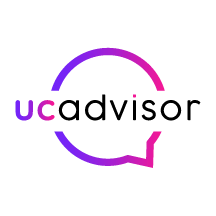
01 Feb Tips for Securing your UCaaS Investment
The rising mobility of the workforce in an age of remote and hybrid work has helped to accelerate the demand for UCaaS. Promising flexibility, scalability, and business continuity, UCaaS technology has taken every industry by storm.
While companies have always been able to benefit from access to flexible communication tools in an aligned environment, access to these solutions in the cloud is becoming mandatory. Currently, Unified Communications as a Service is expected to reach a value of $69.93 billion by 2028.
Through UCaaS in the cloud, companies can empower their team members to stay productive and ready for collaboration, regardless of whether they’re in the office or not. The question is, how do you leverage the freedom and flexibility of the cloud, without security concerns?
Is UCaaS Technology Secure?
Unified Communications as a Service is a rapidly evolving technology designed to provide companies with access to inherently scalable and innovative communications. Via UCaaS, companies can access benefits like:
- Rapid deployment: Access to technology in the cloud means it’s easy to deploy new instances of technology worldwide in a matter of minutes. This is ideal for a future of remote and hybrid work, where teams can work from anywhere.
- Easier management: UC in the cloud can be managed in the cloud. Administration portals enable quick and easy control of tools on a remote basis.
- Better connections: The flow of communication across teams is faster and simpler with a range of tools in one place. Companies can even leverage everything from video meetings to instant messaging in a UCaaS environment.
- Scalability: Adding features, phone numbers, and even seats to a UCaaS solution is quick and simple, no matter how quickly your business grows.
So, do all of these issues come at the expense of security? Not necessarily.
Ever since the concept of unified communications in the cloud first appeared, companies have expressed concerns about managing data in the cloud. While the security of cloud environments has improved significantly over the years, there are always risks associated with any internet connection. The key to protecting your UCaaS deployment, company, and employees is understanding the risks, and how you can reduce them.
Risk 1: Data Centers
UCaaS technology relies on interactions between data centers and end devices. Whenever you deploy a cloud-based system, your technology, information, and all of the interaction data you store is located within a data center. Unfortunately, if you don’t know the location of your data center, you can’t ensure your information is protected, or compliant.
The best way to avoid this problem, is to work with a UCaaS provider offering extensive insights into data center usage. Many UCaaS providers will allow you to choose where you want your data to be stored, and what kind of secure systems you want to have in place, like multi-factor authentication. You can even implement disaster recovery tools, incident response systems, and business continuity plans for peace of mind if something goes wrong.
Risk 2: Data Encryption
Data is passing back and forth between people in a unified communication system at all times, through connections in the cloud. UCaaS solutions enable the sharing of all kinds of communication data, from screen and video sharing to VoIP calls. In the past, internet-based communications like VoIP have had a bad reputation of being unsecure, and easy to intercept.
Today, most UCaaS providers avoid the issues common with cloud connections, by taking extra steps to protect your data. Most conversations are encrypted both in transit and at rest, using TLS security, and the Secure Real-time Transport Protocol (SRTP). This ensures a safer line of communications by ensuring even if someone does access your calls, they won’t be able to understand them.
Risk 3: Poor Employee Practices
Although security risks can have a variety of courses, the majority of data breaches and privacy problems have something to do with employees. Around 73% of companies have suffered serious breaches caused by phishing attacks, while 74% of organizations say they’ve been breached due to employees breaking security rules.
If one of the reasons why you’re leveraging UCaaS technology is because you want to enable a remote workforce, you have to be aware of the threats that come with having team members working outside of your business network. If these employees aren’t properly trained and taught to use the right security policies, they’re likely to make dangerous mistakes. Implementing training methods to improve employee safety measures is crucial for any UCaaS buyer.
It’s also important consider access control. How are you going to manage who should have access to what in your UCaaS system? Administrator portals provided by your UCaaS provider should assist with this, allowing you to assign and remove permissions remotely.
A comprehensive security, privacy, and data management audit will be necessary for a lot of companies making the transition to new UCaaS solutions. Every time you implement a new tool, make sure you’re not risking your security standing.
Risk 4: Unsecure Connections
Speaking of hybrid and remote workers, people operating outside of your workplace will also need to use external methods to connect to your UCaaS technology. The more people you have accessing your tools from remote networks, the more risk there is of one of those connections being unsecure. One of the best ways to protect yourself, and your team, is to implement session border control.
SBC technology is a mechanism specifically used for the protection of VoIP-based networks and endpoints in a hybrid communication environment. Your UCaaS provider should be able to offer insights into how you can use SBC to protect yourself. You may also want to consider additional forms of security, like VPN connections for your team, and sign-ins encrypted by two-factor authentication methods.
Risk 5 Compliance
Finally, even if you manage to protect your teams against issues like phishing and unsecured connections, you still need to think about whether you’re complying with the regulatory and federal standards of your industry. Some companies will only have concepts like GDPR and CCPA to consider, while others will need to look into regulations specific to their industry.
The best way to ensure you’re following the appropriate standards for data privacy and security is to work with a UCaaS vendor who understands your vertical. A company with a deep knowledge of things like HIPAA for healthcare or PCI for finance will be able to help you in implementing a UCaaS tool suitable for your needs.
Need help choosing and implementing the most secure UCaaS offering? Contact the UC Advisor team to start your journey today.



